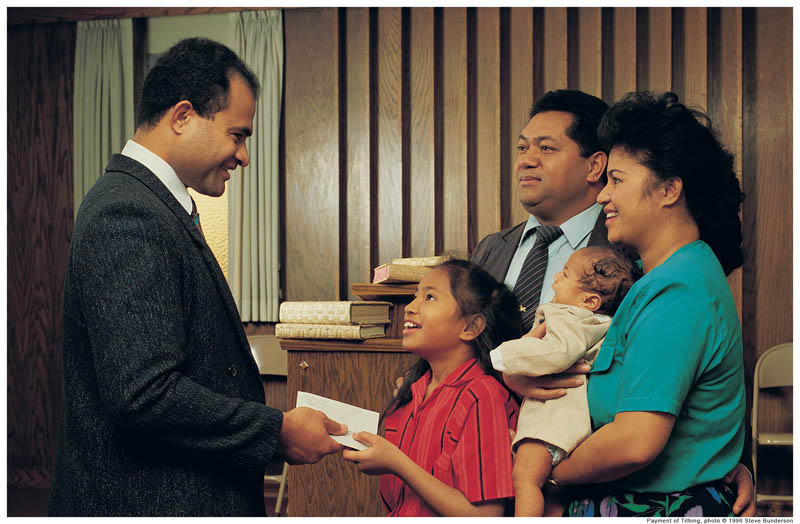 There has been a lot of speculation about Mitt Romey’s taxes, particularly the amount of money he donates to the Mormons. Mormon is a nickname for members of The Church of Jesus Christ of Latter-day Saints, the church to which Romney belongs.
There has been a lot of speculation about Mitt Romey’s taxes, particularly the amount of money he donates to the Mormons. Mormon is a nickname for members of The Church of Jesus Christ of Latter-day Saints, the church to which Romney belongs.
Mormons are taught to pay ten percent of their earned income in tithing. This is a commandment taken directly from the Bible. The word tithe means tenth and God commands His followers to pay a tithe to Him. This, of course, is done by donating it to the believer’s church.
“Bring ye all the tithes into the storehouse, that there may be meat in mine house, and prove me now herewith, saith the Lord of hosts, if I will not open you the windows of heaven, and pour you out a blessing, that there shall not be room enough to receive it” (Malachi 3:10). In Genesis 14:18-20, we learn that Abraham, who was still known as Abram at that time, paid tithing on all he owned. Throughout the Bible, from that time on, we read of people being commanded to tithe.
Jesus Christ praised the widow whose tithing amounted to a mite, a very small amount of money. He pointed out that for her to pay her full tenth required a much greater sacrifice than it did for a wealthy person who might be paying more, but sacrificing less to do it. While a tenth is always required, God does not value the tithe of a wealthy person more than He values the smaller tithe of the poor. The important thing is that we are keeping the commandment.
Since Mitt Romney is a practicing Mormon, he pays a full tithe. He also pays additional donations and because he can afford them, it is likely his donations will be fairly sizable. Anyone who believes in God will naturally be eager to participate in His work in every way possible—through tithes and offerings and through time spent in service.
Mormon tithing is used to further God’s work. It does, of course, pay for the basic costs of running a church—buildings, teaching supplies, missionary work, utility costs, and congregational expenses. Since Mormons have a lay ministry the money is not used to pay salaries to church leaders. When Mitt Romney served as a bishop (lay pastor) and a stake president (a leader over a number of congregations who assists and leads the bishops in their service) he was not paid. He supported his family through his secular employment and did his church work in his “spare” time. Although some apostles and prophets receive a modest living stipend since their work is full-time and some started too young to receive pensions or lack other sources of income, that money is paid through other resources. Unlike many religions, the Mormons do not put all their businesses under the umbrella of a ministry. They operate profitable businesses separately and pay taxes on them. This money is used for the small stipends. No matter how much tithing is paid, the leaders cannot benefit financially. Although many religions have leaders who become wealthy through their ministry, Mormon leaders who have wealth gained it in the their private employment prior to full-time church service.
Tithing is used to educate church members and visitors about the gospel. Teachers are provided with lesson manuals and in some classes, students are as well. Since everyone volunteers, members are told not to use their own money for their volunteer work, known as callings. This means expenses for activities and programs come from tithing funds. Doing so ensures those who can’t afford to donate are not tempted to spend money they can’t afford and don’t feel uncomfortable because they can’t do as much as others.
In addition to Sunday worship, the Mormons run a number of other programs for its members to help them learn and progress and to provide meaningful activities for young people. Children ages eight to eleven participate in Cub Scouts or Faith in God programs, in which they set and meet goals that put their spiritual teachings into practice or improve their ability to live a meaningful life. Teenagers have a weekly program as well. Boys participate in Boy Scouts and Girls have a program of their own, again focused on setting goals and living lives of meaning. They also attend a class each school day in which they study the scriptures in-depth. Two years of the four-year rotation teach the Bible and one year is dedicated to the Book of Mormon. The final year is about church history and a book of modern revelations, known as the Doctrine and Covenants. College students have a program of college level scripture and gospel study.
Although missionaries pay their own expenses during their volunteer missions, the supplies they use are paid for through church funds. Mission costs are the same for all missions, so more expensive missions require supplemental support by the church.
Tithing money helps to build Mormon temples. These are considered to be the literal home of God and so Mormons demonstrate their love for God by creating lovely homes for Him. Throughout the Bible, we see that God periodically commanded His children to create special places to perform sacred ordinances. Eventually, He commanded them to create temples. These were so important that when David wanted to build one because it seemed wrong that David lived in a palace while God’s home on earth was a tent, God refused. David had not been forgiven for his serious sin. God allowed David to begin preparing materials, but his son Solomon was the one allowed to build it. When Solomon too became wicked, the temple was no longer sanctified and approved by God.
Jesus Christ, understanding the sacredness of the temples, was understandable angry at seeing them mistreated by profiteering sellers, turning the highly sacred into an ordinary marketplace. His work in clearing the temple shows the extreme importance of treating these temples and the work done within them with the greatest respect and sacredness. Mormons take great care to build a home for God that shows great love and to treat these temples with the respect Jesus commanded us to give temples built to honor God.
The Mormons also use funds to carry out humanitarian work. There are a number of programs to help those in need. Some assist those who are members of the church and others help people regardless of faith.
The humanitarian aid program helps people and communities world-wide. When a disaster strikes, Mormons are often on the ground before others. In other situations, they wait to find out what is requested first. They bring in food, medical and hygiene supplies, and other equipment as requested. This always goes to anyone in need, regardless of faith. The program also provides humanitarian relief in ways that encourage self-respect and self-reliance. For instance, often a humanitarian group will come in, build a clean water system and leave. If it breaks, the people return to using dirty water until the donor returns. When Mormons create such a system, they expect the villagers to assist. These people are then helped to find a way to finance the necessary maintenance and learn how to care for it themselves. The system is then truly theirs and they are no longer dependent on outsiders. Often, this leads to employment for those responsible for caring for equipment. It also allows the church to move on to help a new village, which means they can assist the greatest number of people possible, rather than focusing on only a few locations.
In addition to clean water, there are ongoing programs in a variety of humanitarian areas, including wheelchairs, immunizations, neonatal resuscitation, and efficient farming. All donations made to this fund go directly to help those in need. Administrative costs are paid through other funds.
In a unique program designed to help members of a Mormon congregation, Mormons are asked to fast for twenty-four hours. This is a complete fast without food or drink of any kind, even water, and is asked of anyone physically able to do so. At the end of the fast, the members donate at least the amount they saved by not eating or drinking and donate it as a “fast offering.” This money goes to people in their own congregation who are facing temporary hardships. It is used to provide basic necessities of life—food, shelter and medical assistance—while the member is helped to return to self-sufficiency through various church programs. Those who receive assistance are encouraged to donate their time to various service projects, in order to help them maintain their self-esteem and contribute to their own support.
When Mitt Romney’s tax returns are analyzed, they are likely to show he participates in God’s work and humanitarian efforts world-wide by paying his full tithe, as commanded in the Bible and honoring his promise to God.
For more on Mormon finances, see Encyclopedia of Mormonism.
About Terrie Lynn Bittner
The late Terrie Lynn Bittner—beloved wife, mother, grandmother, and friend—was the author of two homeschooling books and numerous articles, including several that appeared in Latter-day Saint magazines. She became a member of the Church at the age of 17 and began sharing her faith online in 1992.



